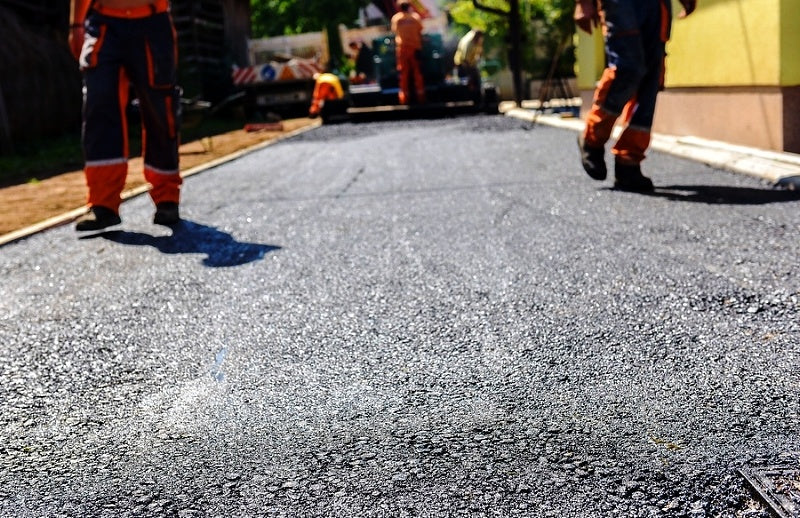
Rock salt (sodium chloride) is one of the most damaging substances that will ever contact your concrete driveway. It accelerates the deterioration caused by winter's freeze-thaw cycles and shortens the lifespan of your concrete pavements. The same is true of asphalt, though to a far lesser degree.
How Rock Salt Damages Concrete
Due to rock salt's easy availability, relatively low cost, and effectiveness at melting snow/ice down to around 25° F (-3.89° C), it is the most popular deicing product on the market. However, it can severely damage concrete if used repeatedly over a long period of time.
Concrete has a rather smooth, solid appearance from a distance, but the "secret" to how rock salt damages concrete lies in the numerous, tiny pores that cover its surface. This feature means that concrete will absorb water. Even in the summer, you can actually see this absorption take place if you throw down a little water on your concrete driveway and wait while it soaks into the pavement.
When snow and ice covers your concrete in the winter, there is no harm done so long as it remains frozen. Once it melts, however, some of the water will seep inside the concrete until it "saturates" it. Once the temperature rises again, the expanding ice will exert internal and upward pressures that could crack your concrete or cause its surface to flake (called "spalling").
Since wintertime temperatures often fluctuate above/below salt rock's snow-melt limit of 25° F (-3.89° C), freeze-thaw cycles may be worse with rock salt than without it. Additionally, salt is "hydro-scopic," meaning that it attracts water to itself. Rock-salt infused concrete can hold up to 10% extra water in it, which is that much more potentially destructive pressure for your concrete driveway to bear.
Fresh-poured concrete has a higher water content and is even more susceptible to rock salt damage. You need at least a 30-day span between winter and the day your concrete driveway is poured. Low-strength concrete is also more susceptible to freeze-thaw damage since it cannot withstand the pressure as well as high-strength mixes. Low-strength concrete also has higher surface porosity, exacerbating the problem even more.
Rock Salt Damages Asphalt
Many people will tell you that asphalt is not affected by rock salt, but that is only a half-truth. It is not directly affected but can be indirectly affected in the same way as concrete (the freeze-thaw cycle). Usually, however, asphalt must be already cracked, fissured, or partly damaged before rock salt will hurt it very much. Once opened up, salt and water are better able to penetrate beneath it. Yet, asphalt is porous as well as concrete, and some damage can be done even to a healthy asphalt drive.
Freeze-thaw damage to asphalt may reveal itself in bumps, pot holes, and a surface that has faded from black to grey. Additionally, cold weather (and cold water) make asphalt more brittle and prone to break when subjected to internal pressures.
Rock Salt Alternatives
To avoid rock salt damage, you can switch to a different de-icer, such as calcium chloride, which works down to -25° F (-3.89° C). Not only will you get better performance, but there will be fewer freeze-thaw cycles since it will seldom (if ever) get that cold outside.
Another possibility is to use concrete pavers in your driveway. Pavers have low porosity and can withstand up to 8,000 pounds (3,628 kg) of pressure, which is higher than ordinary concrete. This would virtually eliminate rock salt damage. An earthen drive planted with a salt-tolerant herb like thyme can also eliminate any fear of rock salt damage.
Otherwise, the main options are thorough shoveling, plowing, and/or snow blowing; installation of an electric or hydronic heated driveway system; or use of portable snow-melting mats designed for driveways. Heated driveways will be expensive to install since you would have to remove and replace your existing driveway. Snow-melting mats will provide a snow/ice free lane to enter/exit your driveway on. They will function much like a heated driveway, not melting large areas but costing much less.
Rock salt can do serious damage to concrete and even to asphalt driveways if used in large quantities and/or over long periods of time. Eliminating or, at least, minimizing the use of rock salt will save you money by extending the life of your pavement, and there are a number of alternative ways to melt snow/ice to make non-use of rock salt practical.


